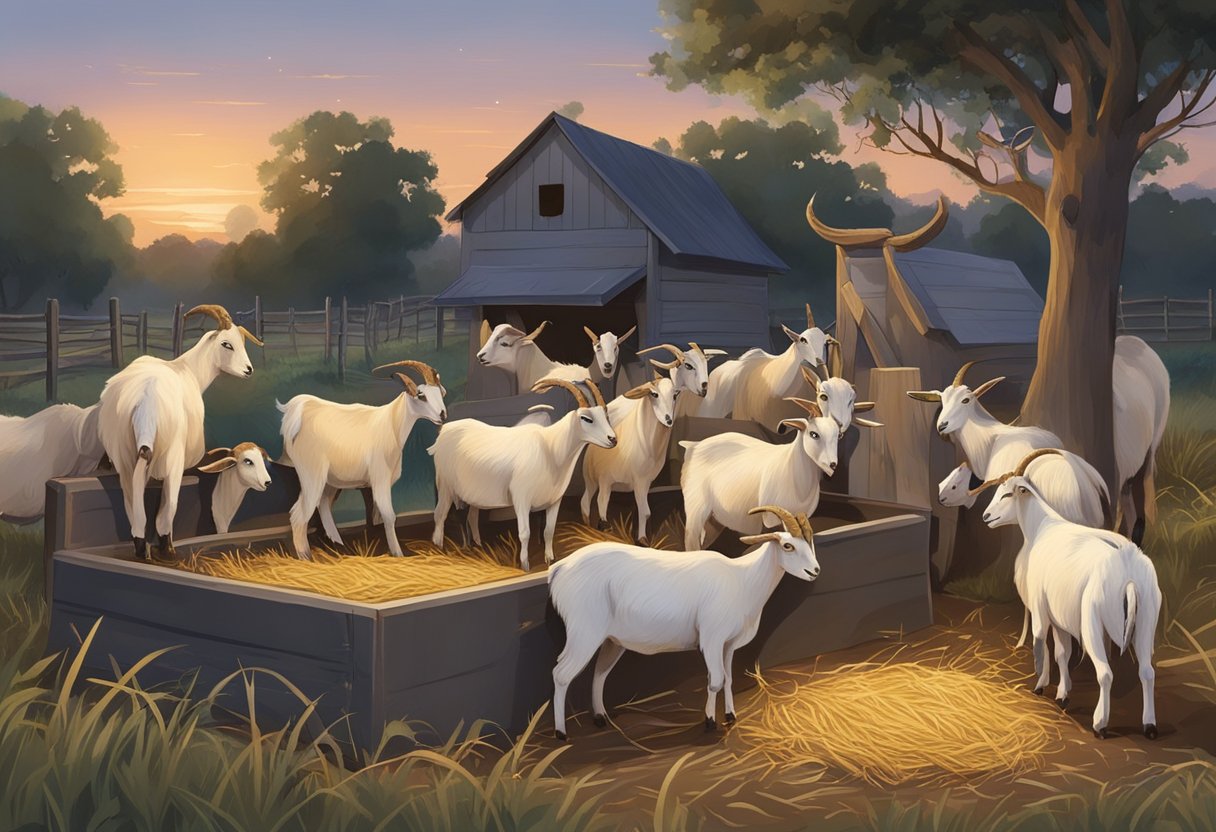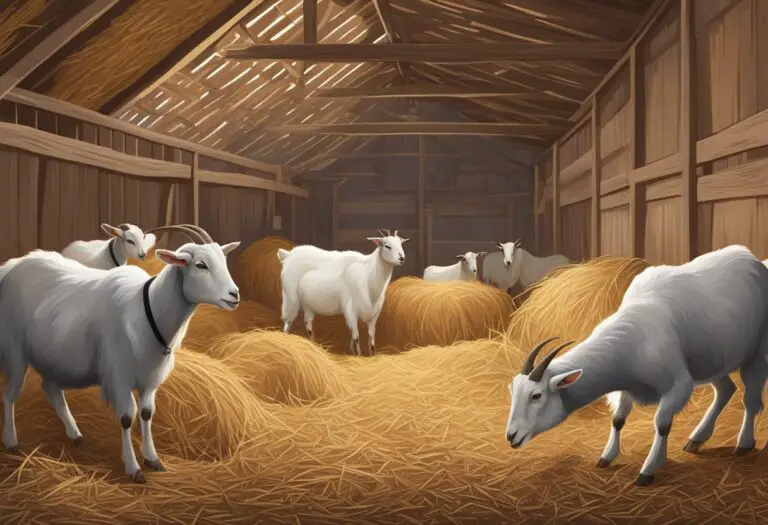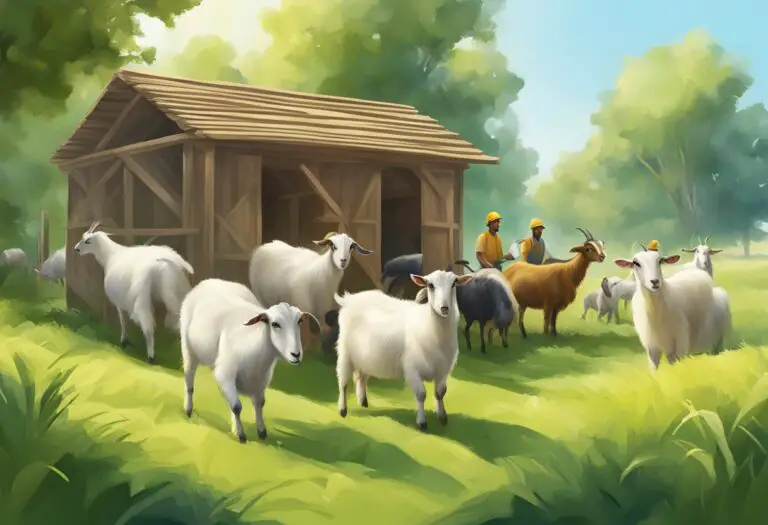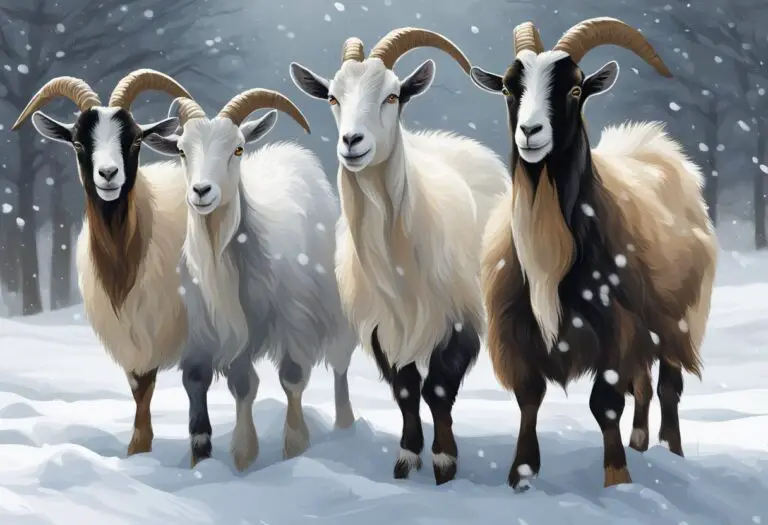When is the Best Time to Feed Goats: Expert Advice
Goats are one of the most popular domestic animals that are kept for their milk, meat, and fiber. Feeding goats is an important aspect of their overall health and well-being. However, many goat owners often wonder when is the best time to feed their goats.
The best time to feed goats depends on various factors, such as their age, breed, and the purpose for which they are being raised. For instance, newborn kids require frequent feeding, while adult goats may need to be fed only once or twice a day. The type of feed and the amount of feed also vary depending on the nutritional needs of the goats.
In this article, we will explore the different factors that determine the best time to feed goats. We will discuss the nutritional requirements of goats at different stages of their life, the types of feed that are suitable for goats, and the feeding schedule that works best for different breeds of goats. By the end of this article, readers will have a better understanding of when and how to feed their goats to ensure their optimal health and productivity.
Understanding Goat Nutrition

Nutritional Requirements
Goats are ruminants, which means they have a four-chambered stomach and require a diet that is high in fiber. The primary component of a goat’s diet should be hay or pasture. Goats also require a source of protein, which can be provided through alfalfa, soybean meal, or other protein supplements.
In addition to fiber and protein, goats also require certain minerals and vitamins in their diet. These include calcium, phosphorus, selenium, copper, and zinc. It is important to ensure that these nutrients are provided in the correct amounts to avoid deficiencies or toxicities.
Feeding Frequency
Goats should be fed at least twice a day to maintain good health. The amount of feed they require will depend on their age, weight, and activity level. As a general rule, adult goats should be fed about 2-4% of their body weight in dry matter per day.
It is important to avoid overfeeding goats, as this can lead to obesity and other health problems. It is also important to provide fresh, clean water at all times.
Overall, understanding the nutritional requirements of goats is essential for maintaining their health and well-being. By providing a balanced diet that meets their needs, goat owners can ensure that their animals thrive and produce high-quality milk, meat, or fiber.
Factors Influencing Feeding Times

Goats have different feeding needs depending on their age, production stage, and the season. Proper feeding is critical to maintaining their health and productivity. Here are some factors that influence feeding times:
Goat Age
The age of the goat plays a significant role in determining feeding times. Young goats require more frequent feedings than mature goats. Kids that are still nursing should be fed multiple times a day. As they grow, their feeding frequency can be reduced to 2-3 times a day. Adult goats can be fed once or twice a day, depending on their nutritional needs.
Production Stage
The production stage of the goat also affects feeding times. Pregnant and lactating goats require more frequent feedings to meet their increased nutritional needs. Pregnant goats should be fed 2-3 times a day, while lactating goats may need to be fed up to 4 times a day. Bucks and wethers have lower nutritional requirements and can be fed once or twice a day.
Seasonal Considerations
Seasonal changes can also affect feeding times for goats. During the winter months, goats require more feed to maintain their body temperature and energy levels. Feeding times may need to be increased to compensate for the increased energy needs. In the summer, goats may need to be fed earlier in the morning or later in the evening to avoid the heat of the day.
In conclusion, the feeding times for goats depend on several factors, including age, production stage, and seasonal considerations. By understanding these factors, goat owners can ensure that their animals receive proper nutrition and stay healthy.
Morning Feeding

Benefits of Morning Feeding
Feeding goats in the morning has several benefits. Firstly, it helps to establish a routine for the goats, which can lead to improved digestion and overall health. Secondly, goats tend to be more active and alert in the morning, which means they are more likely to eat the food provided to them. Thirdly, feeding goats in the morning allows them to graze and forage during the day, which is their natural behavior.
Morning Feeding Routine
A typical morning feeding routine for goats involves providing them with fresh hay and clean water. Goats should have access to hay throughout the day to promote healthy digestion. In addition to hay, goats can be given a small amount of grain or pellets, depending on their nutritional needs.
It is important to note that goats should not be overfed in the morning, as this can lead to health problems such as bloating and obesity. It is recommended to provide goats with small, frequent meals throughout the day, rather than one large meal.
Overall, morning feeding is a beneficial practice for goats, as it helps to establish a routine and promote healthy digestion. By providing goats with fresh hay and clean water in the morning, owners can help ensure the health and well-being of their animals.
Evening Feeding

Goats are ruminants and require a regular feeding schedule to maintain their health and productivity. Evening feeding is an essential component of their diet and should be given the same importance as morning feeding.
Advantages of Evening Feeding
Evening feeding has several advantages over morning feeding. Firstly, it helps goats to maintain their body temperature during the cold winter nights. Secondly, it helps to prevent digestive disorders such as bloat and acidosis. Thirdly, it helps to maintain a consistent milk supply in lactating goats. Lastly, it helps to reduce the risk of predation by nocturnal predators such as coyotes and wolves.
Evening Feeding Schedule
The evening feeding schedule for goats should be consistent and regular. It is recommended to feed goats in the evening, at least 2-3 hours before they go to sleep. This allows them enough time to digest their food before sleeping. The table below shows a sample evening feeding schedule for goats:
| Time | Feed |
|---|---|
| 5:00 pm | Hay or forage |
| 6:00 pm | Grain or concentrate |
| 7:00 pm | Hay or forage |
It is important to note that the feeding schedule may vary depending on the age, weight, and health of the goats. It is recommended to consult a veterinarian or a goat nutritionist to determine the appropriate feeding schedule for your goats.
In conclusion, evening feeding is an essential component of the goat’s diet and should be given the same importance as morning feeding. It has several advantages over morning feeding and helps to maintain the health and productivity of goats. A regular and consistent evening feeding schedule is recommended for optimal results.
Feeding During Extreme Weather

When it comes to feeding goats during extreme weather conditions, it is important to take extra precautions to ensure their health and well-being. In both hot and cold weather, goats can experience stress and discomfort, which can lead to decreased appetite and productivity. Here are some tips for feeding goats during extreme weather conditions:
Hot Weather Feeding
During hot weather, goats may experience heat stress, which can cause dehydration, reduced appetite, and even death. To prevent heat stress, it is important to provide goats with plenty of fresh, cool water and shade. It is also important to adjust their feeding schedule to avoid feeding during the hottest parts of the day. Feeding during the early morning or late evening when temperatures are cooler can help prevent heat stress.
In addition to adjusting their feeding schedule, it is important to provide goats with a balanced diet that meets their nutritional needs. Feeding high-quality forage and supplementing with grain or other concentrates can help maintain their energy levels and prevent weight loss.
Cold Weather Feeding
During cold weather, goats may require additional feed to maintain their body temperature and energy levels. Providing goats with high-quality forage and supplementing with grain or other concentrates can help meet their nutritional needs and prevent weight loss.
It is also important to provide goats with access to clean, dry bedding and shelter to protect them from the elements. Feeding hay in a rack or feeder can help prevent hay waste and keep the goats’ food clean and dry.
In conclusion, feeding goats during extreme weather conditions requires extra care and attention. By providing goats with a balanced diet, access to clean water and shelter, and adjusting their feeding schedule to avoid the hottest or coldest parts of the day, goat owners can help maintain their health and well-being.
Supplementary Feeding

Goats may require supplementary feeding to meet their nutritional requirements, especially during periods of low-quality forage or when they have high energy demands. Supplementary feeding can also be beneficial in improving milk production, growth rates, and overall health of goats.
Types of Supplements
There are various types of supplements that can be provided to goats, including:
- Concentrates: These are high-energy feeds that contain a high percentage of carbohydrates and protein. Examples include grains, legumes, and oilseeds. Concentrates are typically fed to goats in small amounts to supplement their forage intake.
- Protein Supplements: These are feeds that contain high levels of protein and are used to supplement goats’ diets during periods of low-quality forage. Examples include soybean meal, cottonseed meal, and alfalfa hay.
- Mineral Supplements: These are feeds that contain essential minerals that goats require for proper growth and development. Examples include salt, calcium, phosphorus, and trace minerals.
Supplement Scheduling
Supplementary feeding should be done in a manner that meets the nutritional needs of goats while avoiding overfeeding or underfeeding. The amount and type of supplement provided will depend on various factors, including the age, weight, and reproductive status of the goats, as well as the quality and quantity of available forage.
It is recommended to consult with a veterinarian or animal nutritionist to develop a feeding plan that meets the specific needs of goats. In general, supplements should be provided in small amounts on a regular basis, rather than in large amounts infrequently. This helps to ensure that goats receive a consistent supply of nutrients to support their health and productivity.
Common Feeding Mistakes

Overfeeding
One of the most common mistakes made when feeding goats is overfeeding. Goats have a tendency to eat everything in sight, and it’s easy to give them too much food. Overfeeding can lead to health problems such as obesity, bloating, and digestive issues.
To avoid overfeeding, it’s important to measure out the appropriate amount of feed for your goats. The amount will vary depending on the age, weight, and activity level of your goats. It’s also important to provide your goats with plenty of fresh water and to limit their access to treats and other snacks.
Irregular Feeding Times
Another common mistake is feeding goats at irregular times. Goats thrive on routine, and irregular feeding times can lead to stress and digestive issues. It’s important to establish a regular feeding schedule and stick to it as closely as possible.
If you need to make changes to your feeding schedule, do so gradually. For example, if you need to shift feeding times by an hour, do so over the course of a few days to allow your goats to adjust.
In addition to establishing a regular feeding schedule, it’s important to provide your goats with a clean and comfortable feeding area. This will help to prevent the spread of disease and ensure that your goats are able to eat in peace.
By avoiding these common feeding mistakes, you can help to ensure that your goats are healthy and happy.







